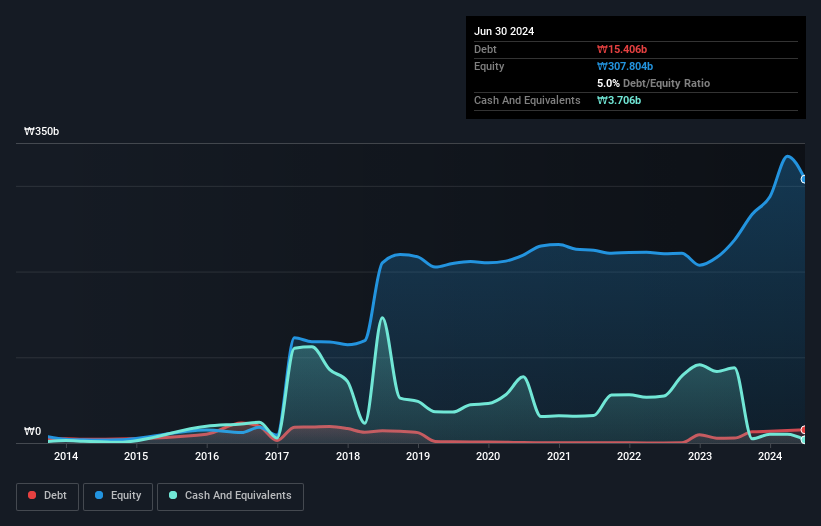Legendary fund manager Li Lu (who Charlie Munger backed) once said, 'The biggest investment risk is not the volatility of prices, but whether you will suffer a permanent loss of capital.' So it seems the smart money knows that debt - which is usually involved in bankruptcies - is a very important factor, when you assess how risky a company is. Importantly, AP Healthcare Inc. (KOSDAQ:109960) does carry debt. But should shareholders be worried about its use of debt?
What Risk Does Debt Bring?
Debt assists a business until the business has trouble paying it off, either with new capital or with free cash flow. If things get really bad, the lenders can take control of the business. While that is not too common, we often do see indebted companies permanently diluting shareholders because lenders force them to raise capital at a distressed price. By replacing dilution, though, debt can be an extremely good tool for businesses that need capital to invest in growth at high rates of return. The first step when considering a company's debt levels is to consider its cash and debt together.
See our latest analysis for AP Healthcare
What Is AP Healthcare's Net Debt?
You can click the graphic below for the historical numbers, but it shows that as of June 2024 AP Healthcare had ₩15.4b of debt, an increase on ₩5.70b, over one year. However, because it has a cash reserve of ₩3.71b, its net debt is less, at about ₩11.7b.

How Strong Is AP Healthcare's Balance Sheet?
Zooming in on the latest balance sheet data, we can see that AP Healthcare had liabilities of ₩28.7b due within 12 months and liabilities of ₩5.03b due beyond that. Offsetting these obligations, it had cash of ₩3.71b as well as receivables valued at ₩17.6b due within 12 months. So its liabilities outweigh the sum of its cash and (near-term) receivables by ₩12.4b.
Since publicly traded AP Healthcare shares are worth a total of ₩71.3b, it seems unlikely that this level of liabilities would be a major threat. But there are sufficient liabilities that we would certainly recommend shareholders continue to monitor the balance sheet, going forward. When analysing debt levels, the balance sheet is the obvious place to start. But it is AP Healthcare's earnings that will influence how the balance sheet holds up in the future. So when considering debt, it's definitely worth looking at the earnings trend. Click here for an interactive snapshot.
Over 12 months, AP Healthcare reported revenue of ₩17b, which is a gain of 30%, although it did not report any earnings before interest and tax. With any luck the company will be able to grow its way to profitability.
Caveat Emptor
Despite the top line growth, AP Healthcare still had an earnings before interest and tax (EBIT) loss over the last year. Its EBIT loss was a whopping ₩30b. When we look at that and recall the liabilities on its balance sheet, relative to cash, it seems unwise to us for the company to have any debt. Quite frankly we think the balance sheet is far from match-fit, although it could be improved with time. Surprisingly, we note that it actually reported positive free cash flow of ₩4.6b and a profit of ₩5.3b. So if we focus on those metrics there seems to be a chance the company will manage its debt without much trouble. When analysing debt levels, the balance sheet is the obvious place to start. But ultimately, every company can contain risks that exist outside of the balance sheet. Case in point: We've spotted 4 warning signs for AP Healthcare you should be aware of, and 1 of them can't be ignored.
When all is said and done, sometimes its easier to focus on companies that don't even need debt. Readers can access a list of growth stocks with zero net debt 100% free, right now.
New: Manage All Your Stock Portfolios in One Place
We've created the ultimate portfolio companion for stock investors, and it's free.
• Connect an unlimited number of Portfolios and see your total in one currency
• Be alerted to new Warning Signs or Risks via email or mobile
• Track the Fair Value of your stocks
Have feedback on this article? Concerned about the content? Get in touch with us directly. Alternatively, email editorial-team (at) simplywallst.com.
This article by Simply Wall St is general in nature. We provide commentary based on historical data and analyst forecasts only using an unbiased methodology and our articles are not intended to be financial advice. It does not constitute a recommendation to buy or sell any stock, and does not take account of your objectives, or your financial situation. We aim to bring you long-term focused analysis driven by fundamental data. Note that our analysis may not factor in the latest price-sensitive company announcements or qualitative material. Simply Wall St has no position in any stocks mentioned.
About KOSDAQ:A109960
Mediocre balance sheet with very low risk.
Market Insights
Community Narratives



